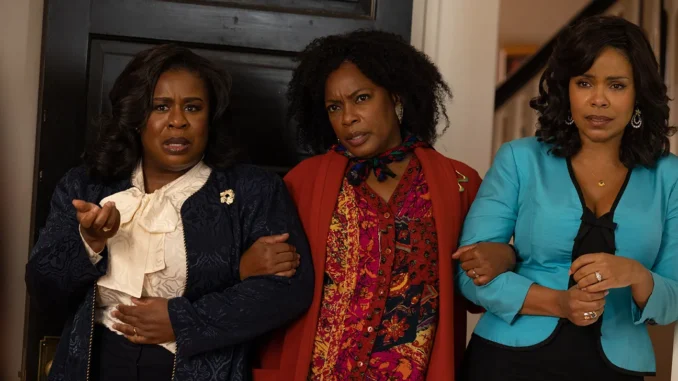
The stars play women who endure life’s ups and downs together in Tina Mabry’s feature adapted from the novel of the same name by Edward Kelsey Moore.
They sauntered into the diner in 1968 with a youthful exuberance. When Earl (Tony Winters), the benevolent owner of the Midwestern eatery, saw them, he couldn’t help but comment. The trio possessed the same confident beauty as Diana, Mary and Florence. So, he called them the Supremes, and the name stuck.
For the next 30 years, Odette (Kyanna “KeeKee” Simone), Clarice (Abigail Achiri) and Barbara Jean (Tati Gabrielle) would meet at Earl’s, slide into the same booth and share their problems, offer support and toast to their lives with the thickest milkshakes.
Directed by Tina Mabry (Mississippi Damned), The Supremes at Earl’s All-You-Can-Eat chronicles the decades-long friendship of these three Black women whose loving and firm camaraderie carries them through heartbreak, tragedy and triumph. Mabry adapted the film with Cee Marcellus (a pen name for The Woman King’s Gina Prince-Bythewood) from the novel of the same name by Edward Kelsey Moore.
The story of these Supremes began with their births in 1950, but when we first meet them it’s 1999. Odette (Aunjanue Ellis-Taylor) sits at the foot of a tree in hospital dress. Her voiceover leading the narrative, she tells us about the beginning of her friendship with Clarice (Uzo Aduba) and Barbara Jean (Sanaa Lathan). As Black girls coming of age in the mid-century, the trio was born into a world that chronically underestimated them. But they were steadfast in their determination to change their fates. Odette planned to be a nurse; Clarice was a gifted pianist; and although Barbara Jean insisted she had no passions, her desire to learn to love herself was just as real a goal.
Mabry’s adaptation of Moore’s book is tender and effective as a portrayal of deep friendships between older Black women. The main narrative thread takes place on the cusp of the new millennium, when the trio convene for Earl’s funeral. The death of this pseudo patriarch prompts self-reflection among the group. They begin to consider the state of their lives: Are they the kind of people their younger selves would be proud of?
To answer this question, Mabry toggles between past and present. The Supremes at Earl’s All-You-Can-Eat repeatedly jumps from 1999 back to pivotal years before. A pit stop in the 1950s acquaints us with their origin stories and a montage of each girl’s birth. Fast forward to 1968 and we learn not only of their first encounter, but of how young Odette (Simone) and Clarice (Achiri) rescued Barbara Jean (Gabrielle) from her abusive stepfather.
Two years later, in 1970, we watch the girls fall in love and navigate the highs and lows of youthful heartbreak. Strong-willed Odette courts shy James (Dijon Means as a teen, Mekhi Phifer as an adult). Clarice catches the eye of charming football star Richmond (Xavier Mills as a teenager, Russell Hornsbry as an adult). Barbara Jean finds herself torn between her passionate love for Ray, the white busboy who works at Earl’s (Ryan Paynter as a teen, Julian McMahon as an adult), and the safer affection of Lester (Cleveland Berto in youth, Vondie Curtis Hall as an adult).

The Supremes at Earl’s All-You-Can-Eat lives in the same misty-eyed universe as films like Waiting to Exhale or The Best Man series. The narrative relies on cliché to propel its characters from one moment to the next. Tragedy is reliably followed by emotional reckoning. A sad moment is never too far from a triumphant one. Intimate framing (by DP Sean McElwee) and a dramatic score by Kathryn Bostic (Toni Morrison: The Pieces I Am) shepherd us from one emotional high to the next. The film’s sentimental mood is built on close-ups of teary faces and establishing shots of the sun’s rays glistening over a body of water.
It would all feel a little suffocating if it weren’t for the performances from the actresses who play both the younger and older Supremes. Their grounded portrayals make the stakes of The Supremes at Earl’s All-You-Can-Eat feel real, and the inevitable outcome seem earned; they anchor a film that might otherwise feel too wispy.
The thrill of seeing Ellis-Taylor work never gets old. In The Supremes at Earl’s All-You-Can-Eat, she assumes the role of a woman whose identity as the maternal figure in the group gets shaken when she is diagnosed with cancer. Now, Odette — always the fighter, never afraid to speak her mind — must ask for help. Aduba’s Clarice is a piano prodigy who gave up a life of touring to start a family with Richmond. In her, we see a woman who must learn to defend herself and her dreams. Lathan’s Barbara Jean is the friend whose life has been the most defined by tragedy. In the moments when all three women are onscreen together, their dynamic is electric.
Simone, Achiri and Gabrielle carry that energy when Mabry takes us to the past. Whether their characters are protecting each other from teenage bullies, doling out reality checks or counseling one another through challenging life decisions, the three deliver committed performances that highlight the thrill of early bonds and bolster our belief in the later ones, too. They keep us invested, making us realize that The Supremes at Earl’s All-You-Can-Eat is, above all else, about how friends become family.
